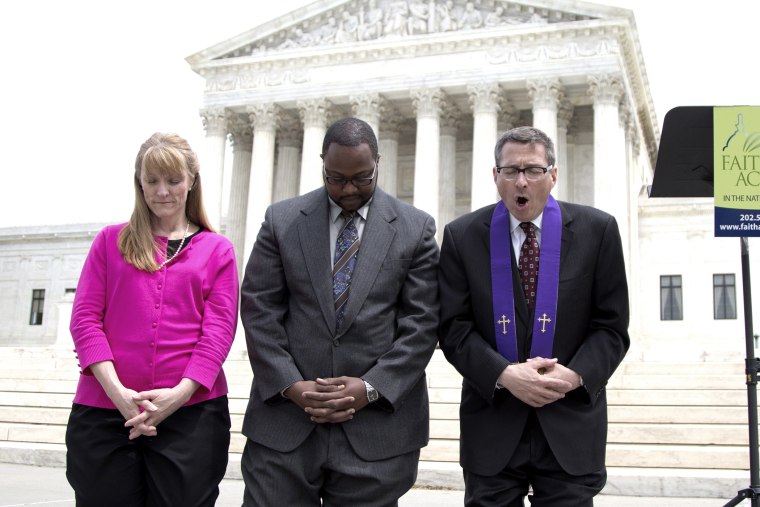A closely divided Supreme Court held Monday that prayers opening town board meetings did not violate the Constitution, even if the individual giving the invocation plainly favors one religion over others.
"As practiced by Congress since the framing of the Constitution, legislative prayer lends gravity to public business, reminds lawmakers to transcend petty differences in pursuit of a higher purpose, and expresses a common aspiration to a just and peaceful society," Justice Anthony Kennedy wrote for the 5-4 majority. "The prayer in this case has a permissible ceremonial purpose. It is not an unconstitutional establishment of religion."
The four Democratic-appointed justices dissented, arguing that in theory prayers opening legislative sessions did not violate the constitutional prohibition on favoring one religion or another, but that the town in question had crossed the line by favoring Christian chaplains who offered prayers that were too sectarian.
Justice Clarence Thomas, in a concurring opinion joined by Justice Antonin Scalia, went even further than Kennedy, writing that only "actual legal coercion" counts, not "the 'subtle coercive pressures' allegedly felt by respondents in this case." (Thomas even implied that states could establish official religions even if the federal government cannot). As University of California, Irvine law professor Rick Hasen noted, the court was divided not just along partisan lines but partly along sectarian ones: All the Jewish justices dissented from the majority, while Justice Sonia Sotomayor was the only Christian member of the court to join the dissent.
Board meetings in Greece, a town in upstate New York, began opening with prayers about 15 years ago. Two attendees at the meetings sued, demanding more “'inclusive and ecumenical' prayers that referred only to a 'generic God' and would not associate the government with any one faith or belief." Greece did invite "a Jewish layman and the chairman of the local Baha’i temple to deliver prayers," and was open to a Wiccan priestess doing so as well, but a federal court ruled that they hadn't done enough to ensure that it didn't seem as though the town were endorsing Christianity.
"When the citizens of this country approach their government, they do so only as Americans, not as members of one faith or another," Justice Elena Kagan wrote in her dissent. "And that means that even in a partly legislative body, they should not confront government-sponsored worship that divides them along religious lines."
From the dissenters' point of view, Greece's prayers were so explicitly Christian they suggested government favoritism for one particular religion. Invocations included references to "the saving sacrifice ofJesus Christ on the cross," and "the plan of redemption that isfulfilled in Jesus Christ," and "the life and death, resurrection and ascension of the Savior Jesus Christ." This same would hold true, Kagan wrote, if town meetings were being opened with Jews saying the Sh'ma or Muslims reciting the Adhan. Chances are if the latter starts happening some conservatives may rediscover a fondness for the separation of church and state -- but probably just mosque and state.
Invocations including basic precepts of Christianity, Kagan wrote, implied a state preference for that religion. "If the Town Board had let its chaplains know that they should speak in nonsectarian terms, common to diverse religious groups, then no one would have valid grounds for complaint."
Conversely, Kennedy wrote that there was no evidence that the prayers themselves interfered with the town board's official duties. "The analysis would be different if town board members directed the public to participate in the prayers, singled out dissidents for opprobrium, or indicated that their decisions might be influenced by a person’s acquiescence in the prayer opportunity," Kennedy wrote, "No such thing occurred in the town of Greece."
The problem with the majority opinion is that the invocation beginning Greece's town board meetings clearly favored Christianity, even if, as Kennedy suggests, there's a long tradition of doing so and the imposition on non-believers was minimal. The problem with the dissent is that Kagan's argument against using "sectarian prayer" to open government proceedings is really an argument against having any kind of prayer in such settings at all.
One could question whether such "nonsectarian prayer," cleaved as it is from the specifics of religious belief, can really be called prayer, but Kagan's reference to terms "common to diverse religious groups," gives the game away. The very existence of prayers opening legislative sessions indicates a state preference for people of faith over people who do not adhere to any religion.
The "moment of silence" that Greece used to begin its town meetings with until 1999 would seem like the fairest compromise, and the one least offensive to the Constitution's prohibition on government religious favoritism. With a moment of silence, every believer can pray according to their beliefs, and every non-believer can use the moment to consider the solemnity of the event.
But if you're going to allow government bodies to open their proceedings with prayers of any kind, then it's hard to disagree with the conservative justices that the people doing so should be allowed to actually pray. Chances are, if the day comes when the prayers don't sound so familiar to a majority of the justices on the court, they'll feel differently.
